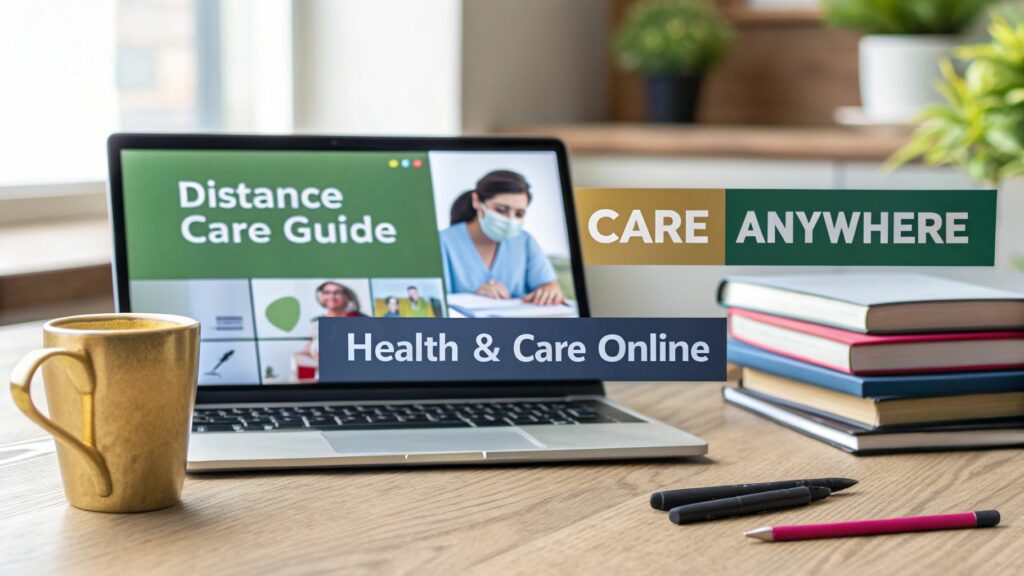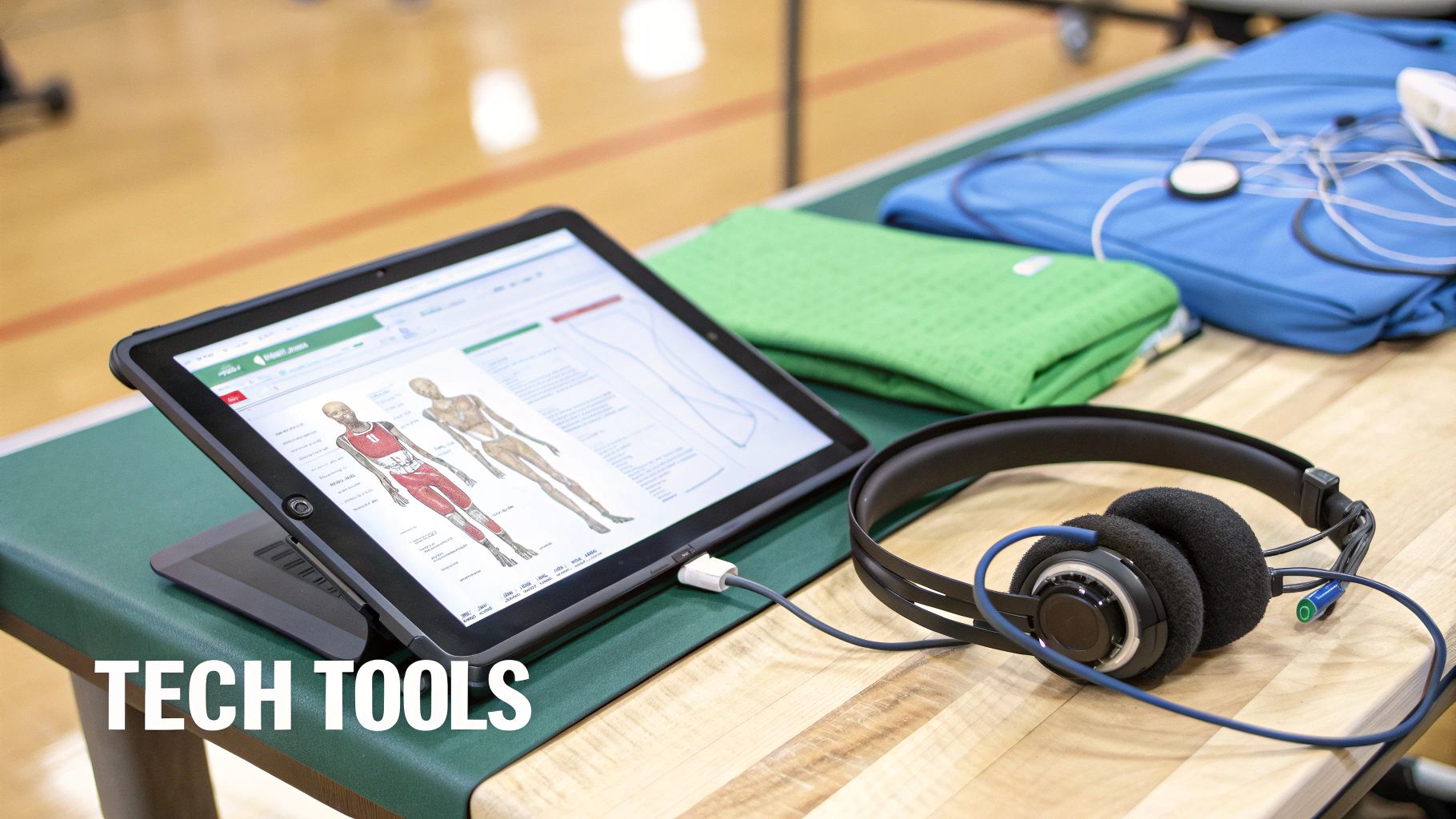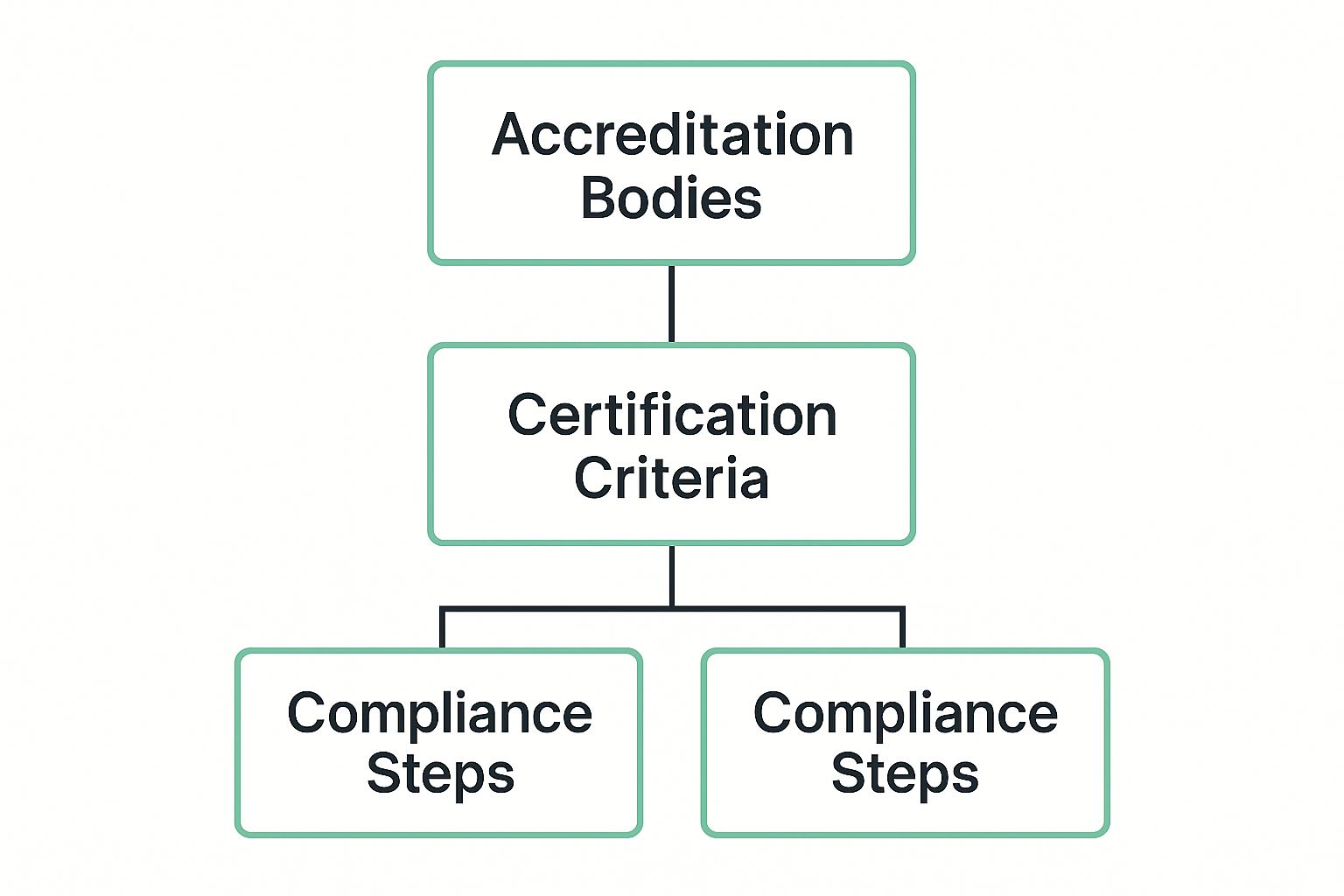
Are you looking for a career where you can genuinely make a difference, but struggling to see how you could fit studying around your life? If you're drawn to health and social care, you might be wondering if you can get qualified without putting your job or family on hold. The answer is a resounding yes.
This is where distance learning comes in. A distance learning health and social care course studied from home is designed for people just like you, offering a practical and accessible way into one of the UK’s most important sectors. You can build the exact skills that employers are looking for, all without ever stepping foot in a classroom.
In this guide, we’ll break down how it all works, what to look for in a quality course, and what kind of career doors will open for you once you’re qualified. Let's get started.

Why Is Now the Perfect Time for Online Learning?
The health and social care world is changing fast, and technology is at the heart of it. This shift isn't just about convenience; it's about getting you ready for a modern workplace where being comfortable with digital tools is a must.
Just look at the push towards digital social care records (DSCRs) in England. By April 2025, an estimated 77.3% of adult social care providers were using them, a huge jump from 66.8% the year before. This rapid shift shows that the skills you naturally develop while studying online—like managing information digitally and communicating effectively from a distance—are exactly what’s needed on the ground.
Your online qualification doesn't just teach you about care; it prepares you for how care is delivered today.
Getting the Fundamentals Right
A great career in care is built on more than just procedures; it’s built on empathy, ethics, and a deep understanding of people. As you begin, you’ll explore powerful approaches like Trauma-Informed Care, which completely reframes how we support vulnerable individuals.
Distance learning is the ideal setting to get to grips with these core ideas at your own speed. You'll cover essential topics like:
-
Principles of Person-Centred Care: This is all about learning to put the individual—their wishes, values, and needs—at the absolute centre of every decision.
-
Safeguarding and Protection: You'll understand your fundamental duty of care and learn how to protect vulnerable adults and children from harm.
-
Effective Communication: It’s about more than just talking. You’ll develop the skills to build genuine trust and rapport with service users and colleagues.
-
Health and Safety Procedures: This is the practical knowledge needed to ensure the environment is safe for everyone you support and work with.
By mastering these fundamentals through a flexible online course, you’re not just earning a certificate. You’re building the confidence and competence to provide exceptional care from your very first day on the job.
What's It Like to Study Online?

If you're thinking about starting a distance learning health and social care course, it's natural to wonder how it all works. The good news is that these programmes are designed to be intuitive and supportive, guiding you every step of the way. Think of it less like a traditional classroom and more like a guided apprenticeship, where you build your skills logically from the ground up.
Your journey starts with the essentials. The first modules lay a solid foundation, ensuring you have a firm grasp of the core principles that underpin all quality care. It’s all about setting you up for success before you dive into more specialised topics.
Starting with a Strong Foundation
Right at the beginning, your course will focus on the ‘why’ behind the ‘what’. You’ll get to grips with the ethical and theoretical pillars of the sector. This context is crucial because it helps you make informed, compassionate decisions when you're out in the field.
This isn't just about reading theory from a book. It’s an interactive experience designed to build your confidence. You’ll learn how to apply these big ideas to the real-life situations you’ll face every day in a care role.
You'll typically start by covering topics like:
-
Care Ethics and Principles: Getting to the heart of the moral and professional standards that guide every action.
-
Legal Frameworks and Responsibilities: Understanding the laws and regulations that protect everyone involved, from service users to care providers.
-
Equality, Diversity, and Inclusion: Building the awareness needed to provide fair, respectful care to people from all walks of life.
The Tools and Resources at Your Fingertips
Once you have that solid base, you’ll start building your practical skills using a whole host of online tools. Modern distance learning is so much more than just downloadable PDFs. It’s a dynamic and engaging environment built to suit how you learn best.
Through a dedicated online portal, you get 24/7 access to a rich mix of resources. This flexibility is a game-changer. You can fit your studies around your life, whether you're an early bird or a night owl.
A well-designed online course gives you more than just information; it offers a community and a support system. The whole point is to make sure 'distance' learning never actually feels distant.
Your digital toolkit will usually include:
-
Engaging Videos: Tricky subjects are broken down into short, digestible videos you can watch as many times as you need.
-
Interactive Digital Textbooks: These are often packed with mini-quizzes and helpful links to check your understanding as you go.
-
Lively Online Forums: A dedicated space to chat with fellow students, ask tutors questions, and share ideas, which helps build a sense of community. Much like our Community Hub.
Assessments That Genuinely Prepare You
Forget about sweating over last-minute revision for a big exam. Assessments in distance learning health and social care courses are designed to see how well you can apply your knowledge to realistic situations. It’s a much more valuable way to prepare you for your future career.
You’ll show what you’ve learned through assignments that reflect the kind of tasks you'll actually do in a care setting. This approach is not only less stressful but also helps lock in your learning, turning theory into real-world competence.
To give you a clearer picture, let's break down what you'll typically encounter.
Typical Course Structure and Learning Methods
This table outlines the common components and delivery methods you'll find in a typical distance learning health and social care programme.
|
Module / Component |
Learning Method |
Assessment Type |
|---|---|---|
|
Foundational Principles |
Videos, interactive e-books, guided reading |
Short quizzes, written reflections on core concepts |
|
Communication Skills |
Role-playing scenarios (video), group discussions on forums, case study analysis |
Written analysis of a communication breakdown, practical skill demonstration |
|
Safeguarding |
E-learning modules, webinars, policy document reviews |
Case study analysis, development of a safeguarding plan |
|
Person-Centred Care |
Reflective journaling, peer-to-peer feedback sessions, practical project work |
Creation of a person-centred care plan, reflective essay on personal practice |
|
Final Project/Portfolio |
Self-directed research, one-to-one tutor mentoring, virtual presentations |
Submission of a final portfolio of work or a detailed research project |
As you can see, the focus is always on practical application rather than just memorising facts.
And remember, you’re never going it alone. Throughout the entire process, dedicated tutors and student support teams are on hand to give you feedback, answer questions, and offer guidance. This network is a cornerstone of a great online learning experience.
Choosing the Right Accredited Qualification
Diving into the world of distance learning health and social care can feel a bit overwhelming at first. With so many courses available, how do you find the one that will actually get you where you want to go? The secret is to figure out where you are now and what your long-term goals are.
Think of it like a career ladder. Each qualification is a rung that takes you higher, opening up doors to more senior or specialised roles. Your first task is simply to find the right starting point for your journey.
Understanding Qualification Levels
Not all qualifications are the same, and they’re structured to help you build your career step by step. A Level 2 Certificate, for instance, is the perfect starting point if you're new to the sector. It gives you all the essential knowledge needed for entry-level jobs – it’s the solid foundation for everything that comes next.
If you already have some experience or you're aiming for a role with more responsibility, a Level 3 Diploma is usually the next logical step. For those with bigger ambitions, like going to university or moving into management, you’ll be looking at a Level 5 Diploma or an Access to Higher Education Diploma.
To help you get your bearings, here are the most common levels:
-
Level 2 Certificate: Ideal for beginners, giving you a great introduction to the core principles of care.
-
Level 3 Diploma: The industry standard for many skilled roles, showing you have a much deeper competence and understanding.
-
Level 5 Diploma: Designed for aspiring managers, focusing on leadership, strategy, and advanced practical skills.
If the idea of continuing your studies excites you, it's worth exploring the benefits of higher-level learning. You can learn more about why you should study healthcare in our detailed guide.
The Non-Negotiable Importance of Accreditation
Let’s talk about the single most critical factor in your decision: accreditation. An accredited qualification is your seal of quality. It’s a stamp of approval from an official body that proves your course meets strict national standards.
In the UK, the main regulator is Ofqual (The Office of Qualifications and Examinations Regulation). When a course is Ofqual-regulated, it means every single element—from the syllabus to the final assessment—has been thoroughly vetted. Employers know and trust these qualifications, which gives you a huge head start in the job market. Taking a chance on a non-accredited course is a risk that could leave you with a certificate that isn’t worth the paper it’s printed on.

As you can see, official accreditation isn't just a label. It's a robust process designed to ensure quality and give employers complete confidence in your skills.
How to Verify a Course and Provider
So, how can you be sure a course is the real deal? Any reputable provider will be upfront and transparent about its accreditation. When you're looking at a distance learning health and social care programme, there are a few key things you should always check.
Choosing an accredited course isn’t just a recommendation; it's the only way to ensure your hard work translates into a qualification that employers respect and your future career deserves.
Before hitting that ‘enrol’ button, just run through these simple checks:
-
Check for the Awarding Organisation: Look for the name of the awarding body (like TQUK or NCFE CACHE) on the course description. These organisations are regulated by Ofqual. On the Stonebridge website, you can find this information on the 'Qualification' tab on the course pages.
-
Verify on the Ofqual Register: You can put the qualification title into the official Ofqual Register online to confirm it’s legitimate.
-
Read Student Reviews: See what past students are saying. Their honest feedback is a goldmine of information about tutor support and course quality.
-
Ask Questions: Don’t be shy! Contact the provider and ask about their accreditation, tutor qualifications, and support options. A trustworthy provider will have nothing to hide.
Unlock the Benefits of Studying Remotely

Choosing to study online instead of at a traditional college is a big decision, but the perks go way beyond just a flexible schedule. When you opt for a distance learning health and social care course, you’re signing up for a unique set of skills and practical advantages that are a perfect match for the modern care sector.
From the start, you'll find yourself naturally building skills that employers value. You’re the one managing your schedule, which builds fantastic time management and self-discipline. These aren’t just "soft skills"—they're the core traits of any reliable and effective care professional.
Develop Skills for a Modern Career
The very nature of studying online means you get comfortable with digital tools fast. This kind of digital fluency isn't just a nice-to-have anymore; it's a must-have in a field that increasingly uses technology for everything from patient records to team communication.
This shift isn't just happening in the workplace. Recent UK government figures show a clear move towards more specialised and remote learning pathways. As of January 2025, there were 638,700 children and young people with Education, Health and Care (EHC) plans—a 10.8% jump from the year before. This surge highlights just how vital flexible, accessible education has become.
Earn While You Learn
Perhaps one of the biggest wins for distance learning is getting qualified without putting your life on hold. You can keep your job, earn a living, and even get hands-on experience in a care setting, all while you study.
The ‘earn while you learn’ model is a real game-changer. It means you can take the theory from your course and apply it directly to real-life situations at work, which makes your learning stick and helps you climb the career ladder faster.
This hands-on approach gives you a clear edge:
-
Immediate Application: Connect what you learn in your modules to what you do day-to-day.
-
Build Your CV: You’re not just a student; you're an active professional gaining priceless experience.
-
Financial Stability: Forget having to sacrifice your income or rack up huge debts to get qualified.
See Significant Cost Savings
The financial argument for studying from home is compelling. When you cut out the daily commute to a campus, the savings really start to stack up. Just think of the money you'll save on transport, parking, or even childcare.
On top of that, online courses often have more competitive tuition fees than their on-campus equivalents. Because providers have lower overheads, they can often pass those savings straight on to you.
To give you a clearer picture, let's compare the two side-by-side.
Distance Learning vs Traditional College: A Comparison
|
Feature |
Distance Learning |
Traditional College |
|---|---|---|
|
Schedule |
Highly flexible, study anytime |
Fixed timetable, set class hours |
|
Location |
Study from anywhere with internet |
Must attend a physical campus |
|
Pace |
Self-paced, move at your own speed |
Follows a strict semester schedule |
|
Costs |
Lower tuition, no travel costs |
Higher tuition, plus travel & living expenses |
|
Work/Study Balance |
Easy to work full-time while studying |
Challenging to balance with a full-time job |
|
Skills Gained |
Strong self-discipline & digital skills |
In-person networking & group work |
This table shows that while both paths lead to a qualification, the journey is very different. For a deeper dive, you can explore how to break free from the classroom with distance learning.
Ultimately, choosing distance learning health and social care is a smart investment in your future. You get a respected qualification and develop skills that are in high demand, all in a way that’s financially sound and fits your life.
Discover Your Future Career Path
Finishing your course is so much more than just getting a certificate—it’s your ticket to a world of professional opportunities. A qualification in health and social care opens up a sector that’s broader and more varied than most people realise. It's a field where you can find a role that not only uses your skills but also ignites your passion for helping others.
This is where your studies turn into real impact. With the right qualification, you can step into roles that are not just personally fulfilling but also in huge demand across the UK. The career paths are incredibly diverse, offering a clear route for progression whether you're aiming for a hands-on support role or a senior leadership position.
Entry-Level and Foundational Roles
If you’re just starting out, a Level 2 or Level 3 qualification is the perfect launchpad. These courses prepare you for those vital front-line roles where you're providing direct, day-to-day support, helping people live safer, healthier, and more independent lives.
Common career paths at this level include:
-
Care Assistant: Working in a residential home or out in the community, you'll help clients with daily activities like personal care, medication, and mobility. The average salary is around £21,000 to £24,000 a year.
-
Support Worker: This role involves helping individuals with learning disabilities or mental health conditions to live as fully and independently as possible.
-
Healthcare Assistant: Often based in hospitals or GP surgeries, you'll work alongside nurses and doctors to provide patient care, from taking temperatures to assisting with meals.
Specialised and Senior Positions
Once you have some experience, perhaps after completing a Level 3 or 5 Diploma, you'll find even more doors open. These roles demand a deeper knowledge of specific needs and often come with more responsibility, like coordinating care for others and handling more complex situations.
Some of these rewarding career options include:
-
Learning Disability Support Worker: A specialised role where you focus entirely on empowering individuals with learning disabilities to achieve their goals.
-
Senior Care Assistant: After proving yourself on the front line, you can step up to a supervisory role. You’ll be mentoring new staff, developing care plans, and acting as the main contact for families. Salaries here often range from £24,000 to £28,000.
-
Care Coordinator: An organisational role where you manage care schedules, assess client needs, and ensure your team of care workers is delivering top-quality support.
A career in health and social care offers a clear ladder for progression. Every role provides an opportunity to develop new skills, take on greater challenges, and make an even bigger difference in people's lives.
Leadership and Management Opportunities
Got your sights set on leadership? A distance learning health and social care course can be your stepping stone to management. A Level 5 Diploma, for example, is built specifically to give you the strategic skills needed to run a care service effectively.
Potential management roles include:
-
Residential Care Manager: You would be responsible for the entire operation of a care home—managing staff, budgets, and ensuring compliance with regulations. Salaries for this position often start from £35,000 and can climb much higher with experience.
-
Service Manager: You might oversee a specific service, like a supported living facility or a community outreach programme. Your job is to lead the team and drive the quality of support they provide.
As you map out your future, it’s also smart to get ready for how companies hire today. Many employers now use online interviews, so brushing up on some crucial virtual interview tips can give you an edge. To learn more, read our guide on the rewards of a career in health and social care.
Your Simple Guide to Getting Started
Ready to take the next step? Enrolling in a health and social care course online might feel like a big decision, but it’s actually far simpler than you think. I’ve laid out the entire process below, breaking it down into a straightforward checklist to get you from browsing to your first day of study.
Think of this as your practical roadmap. Following these steps will help you move forward with confidence and turn your career ambition into an achievable plan.
Step 1: Find a Provider You Can Trust
First things first, you need to find a training provider that’s the real deal. As we discussed earlier, accreditation is absolutely key. Only look at colleges that are regulated by official bodies like Ofqual, as this is your guarantee that employers will take your qualification seriously.
Shortlist two or three providers that offer the course level you’re after. Have a good look around their websites, read what other students have to say, and get a feel for how they operate. A quality provider will always be upfront about course content, fees, and tutor support.
Step 2: Check the Entry Requirements
Once you have a few providers on your radar, it's time to check the specifics. The entry requirements can change depending on the qualification level you're aiming for.
-
For Level 2 or 3 courses: You usually don't need any specific previous qualifications. A good grasp of English and basic computer skills are generally all that's required.
-
For Level 5 or Access to HE Diplomas: You will likely need GCSEs in English and Maths at grade C/4 or higher, or an equivalent qualification.
Don't panic if you don't tick all the boxes right away. Many providers, Stonebridge included, offer Functional Skills courses to help you get the qualifications you need to progress.
Honestly, the most important thing providers look for is your passion and commitment. They want to see motivated people who are genuinely ready to learn and make a difference.
Step 3: Figure Out Your Funding
Working out how to finance your studies is a huge piece of the puzzle. The good news is that distance learning health and social care courses are often more budget-friendly than traditional programmes. Many providers now offer flexible payment plans, which let you spread the cost with a manageable monthly subscription.
This way, you don't have to worry about finding a huge sum of money up front. It gives you complete financial control—you can start, pause, or even cancel your studies if your circumstances change.
Step 4: Have a Chat with a Course Advisor
Before you sign up, try talking to a course advisor. This is your chance to get answers to all your questions and to double-check that the course is right for you. A good advisor won’t just give you a sales pitch; they’ll listen to your goals and help you figure out the best path forward.
It helps to have a few questions ready. You could ask:
-
What kind of support can I expect from my tutor?
-
How will I receive the course materials?
-
On average, how long does it take students to finish this course?
-
Could you walk me through the assessment process?
Step 5: Fill Out Your Application
Finally, it's time to complete the application form. This is nearly always a simple online process. You’ll just need to fill in your personal details, list any relevant qualifications, and provide your payment information. Once you hit submit, the college will review everything and get in touch to welcome you. It’s as simple as that—you're officially on your way.
Got Questions? We've Got Answers
It’s completely normal to have questions buzzing around your head when you're considering a new course. Having all the facts is the best way to feel confident about your next step.
Let's clear up some of the most common queries people have about studying health and social care from home.
Do I Need Hands-On Experience to Pass?
That’s a great question, and it really depends on the level of the course. For higher-level qualifications, like a Level 3 Diploma, a work placement is a core part of the learning. Think of it less as a hurdle and more as your chance to put theory into practice in a real care environment. It’s where you prove you have the skills to make a real difference.
Don't worry, course providers know that finding a placement can feel like a big task, so they usually offer plenty of support to help you find the right spot.
If you're already working or volunteering in care, that experience often counts towards your qualification. For introductory courses, such as a Level 2 Certificate, a placement usually isn't required.
How Much Time Should I Set Aside Each Week?
The freedom to set your own pace is one of the best things about learning online. The time you need each week really depends on the course you choose and how quickly you like to work.
As a rough guide, for a Level 3 Diploma, you’ll probably want to set aside between 8 and 12 hours a week.
But here’s the brilliant part: you decide when those hours happen. You can fit your studies around your job, your family, or anything else you have going on. There’s no rigid college timetable to follow.
Whether you're an early bird or a night owl, you can create a schedule that works for you. It puts you in charge of your own learning journey.
Will Employers Actually Value an Online Qualification?
Yes, one hundred percent. This is a common worry, but you can put it to rest. As long as your qualification is from a recognised and regulated awarding body like Ofqual, employers see it as every bit as valuable as one earned in a classroom.
In fact, many employers are really impressed by candidates who’ve studied online. Why? Because it tells them you’ve already mastered skills that are essential in any modern workplace.
Studying a distance learning health and social care course shows you have:
-
Self-discipline: You’ve shown you can drive your own learning and see things through without someone looking over your shoulder.
-
Great time management: Juggling studies with life proves you’re organised, reliable, and can handle responsibility.
-
Strong digital literacy: You’re comfortable with the online tools and platforms that are becoming more important in the care sector.
These skills are a massive plus for any employer and can give you a real advantage when you’re looking for a job.
Ready to take the first step towards a career where you can truly make a difference? With Stonebridge Associated Colleges, you can earn an accredited, employer-respected qualification that’s built to fit around your life. Explore our flexible subscription courses and find your perfect path at https://www.stonebridge.uk.com.




